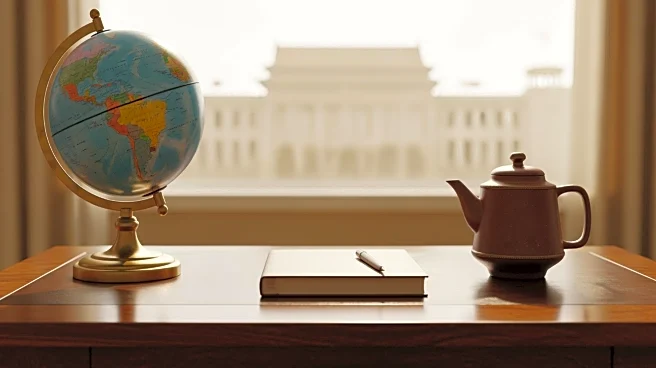What's Happening?
The White House has released images of Chinese President Xi Jinping that contrast with his typically serious public persona. These images were taken during the Asia-Pacific Economic Cooperation (APEC)
summit in South Korea, where Xi met with U.S. President Donald Trump. The photographs captured candid moments, including Xi smiling and joking with South Korean President Lee Jae Myung. This is a departure from the carefully controlled image of Xi usually portrayed in Chinese state media. The images show Xi in a more relaxed setting, engaging in light-hearted exchanges, which is uncommon in his public appearances.
Why It's Important?
The release of these images is significant as it provides a rare glimpse into the personal side of Xi Jinping, which is not typically visible in China due to strict media control. This could influence international perceptions of Xi, showing a more approachable side of the Chinese leader. The images also highlight the ongoing diplomatic interactions between China, the U.S., and South Korea, emphasizing the importance of these relationships in global politics. The candid nature of the images may also impact how Xi is viewed domestically, as they contrast with the serious image maintained by Chinese state media.
What's Next?
The release of these images may prompt discussions about media control and image management in China. It could lead to increased scrutiny of how Chinese leaders are portrayed both domestically and internationally. Additionally, the interactions between Xi and other world leaders at the APEC summit may influence future diplomatic engagements and negotiations, particularly concerning trade and cybersecurity issues. Observers will likely continue to analyze Xi's public appearances for insights into China's political strategies and international relations.
Beyond the Headlines
The images of Xi Jinping at the APEC summit may also reflect broader cultural and political dynamics within China. The contrast between his public image and these candid moments could spark discussions about the role of media in shaping public perceptions of leadership. It may also highlight the challenges faced by Chinese citizens in accessing diverse perspectives on their leaders due to censorship. This event underscores the complexities of international diplomacy, where personal interactions can play a crucial role in shaping political outcomes.











